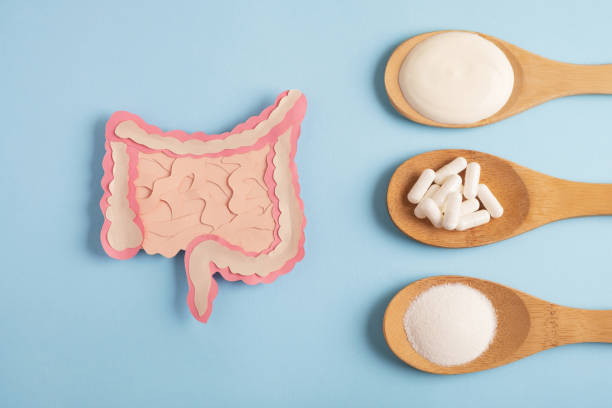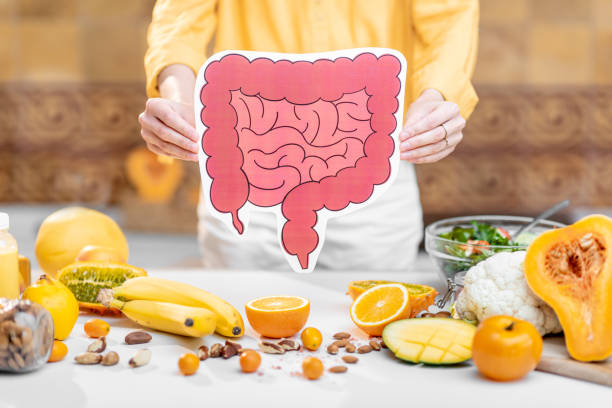The health of your gut significantly impacts your overall health and well-being, and this also applies to fertility. Recent studies have shown a direct correlation between gut health and reproductive health.
In this blog, we will delve into the correlation between gut health and fertility and how enhancing your gut health can heighten your chances of getting pregnant. So, if you’re looking to start or expand your family, read on to learn more about supporting your gut health for optimal fertility.
The Gut Microbiome
The gut microbiome is a collection of tiny organisms that live in the gastrointestinal tract. It helps regulate many essential bodily functions, including fertility. Ensuring the bacteria in your gut are balanced is crucial for optimal fertility since it regulates hormones, metabolism, and your immune system. Research shows that an imbalanced gut can lead to fertility issues like endometriosis, PCOS, and infertility. One way the gut microbiome can affect fertility is by regulating hormonal balance. Hormones such as estrogen and progesterone play a critical role in the menstrual cycle and are essential for conception. An imbalanced gut microbiome can cause excess estrogen production, negatively affecting the menstrual cycle and ovulation.
Additionally, an unhealthy gut microbiome can lead to inflammation, interfering with the reproductive system’s ability to function correctly. Chronic inflammation can damage reproductive organs, impairing their ability to produce and release eggs or sperm. Therefore, maintaining a healthy gut microbiome through diet, lifestyle changes, and other interventions is critical for optimizing fertility.
Improving your overall gut health for fertility requires you first to understand the role of the gut microbiome. Now, look closer at the connection between gut health and inflammation and how an inflamed gut can lead to fertility issues.
Gut Health & Inflammation

The body’s immune system responds to harmful invaders like bacteria and viruses by triggering a natural process called inflammation. Although some inflammation is helpful, chronic inflammation can adversely affect general health, including fertility. Chronic inflammation can interfere with hormone balance, disrupt the menstrual cycle, and even damage reproductive tissues.
The gut has a vital role in controlling inflammation in the body. The gut lining contains immune cells that identify and respond to potential threats. Chronic inflammation can affect various body parts, including the reproductive system, when the gut microbiome is imbalanced.
If inflammation affects your gut, it may lead to a condition called “leaky gut.” This occurs when the gut’s lining sustains damage, which allows hazardous substances and toxins to enter the bloodstream. These toxins can trigger inflammation in the entire body and exacerbate the issue.
Inflammation caused by an imbalanced gut microbiome can interfere with fertility in both men and women. In women, chronic inflammation can lead to irregular periods, endometriosis, and even premature ovarian failure. In men, chronic inflammation can reduce sperm quality and quantity, leading to infertility.
Therefore, it’s essential to maintain a healthy gut microbiome to prevent chronic inflammation and improve fertility.
Regarding fertility, inflammation, and nutrient absorption are closely linked to gut health. Inflammation can hinder nutrient absorption, which can then lead to fertility issues. In the next section, we’ll explore the role of nutrient absorption in fertility and how gut health plays a vital role in this process.
Nutrient Absorption & Gut Health

As we all know, proper nutrition is essential for overall health, including reproductive health. Our bodies require nutrients, vitamins, minerals, and antioxidants to function correctly, including for fertility. However, even if we consume a nutrient-rich diet, poor gut health can prevent our bodies from effectively absorbing and utilizing those nutrients.
The gut is responsible for absorbing and delivering nutrients from our food to our cells. However, when the gut is compromised, it can lead to poor nutrient absorption. This can be due to factors such as inflammation, an imbalanced gut microbiome, or damage to the intestinal lining.
Compromised nutrient absorption can result in deficiencies of vital nutrients such as iron, folate, and vitamin D. These nutrients are essential for reproductive health, and if they are lacking, fertility problems like irregular menstrual cycles, poor egg quality, and anovulation can occur.
Therefore, it’s essential to prioritize gut health to ensure optimal nutrient absorption and utilization for fertility. This includes following a nutrient-dense diet, managing stress, and avoiding gut irritants like processed foods, alcohol, and excessive sugar. Maintaining good gut health is essential to help our bodies absorb and use the nutrients required for optimal fertility.
Ensuring a well-functioning digestive system is vital to maintaining good health and a sense of well-being, and it is especially important when it comes to fertility. In addition to its role in the absorption of nutrients, a healthy gut plays a crucial part in the connection between the stomach and the brain, which can impact fertility.
Let’s explore how stress and the gut-brain axis can affect gut health and fertility.
Gut-Brain Axis & Fertility
The connection between the gut and the brain is a multifaceted communication network, known as the gut-brain axis, that enables them to interact and impact each other. This axis plays an important role in regulating many bodily functions, including fertility. It allows the gut to influence hormone levels, immune function, and stress responses.
Studies have indicated that stress, whether physical or emotional, can have negative impacts on both gut health and fertility. Fertility issues can result from imbalances in the gut microbiome, inflammation, and poor nutrient absorption, all of which can be caused by chronic stress. In addition, stress can also directly impact hormone levels and interfere with ovulation.
The gut-brain axis also regulates the menstrual cycle, as the hormones involved in ovulation and menstruation are also influenced by gut health. An imbalanced gut can lead to irregular periods, making it difficult to conceive.
Therefore, it is essential to support gut health through a healthy diet, stress management techniques, and regular exercise to promote optimal fertility.
As we’ve seen, the gut-brain axis plays a significant role in our overall health and fertility. Reducing stress and improving gut health can positively impact this axis and enhance fertility. In the next section, we’ll discuss some lifestyle changes, foods, and supplements that can help us achieve optimal gut health and support our fertility.
Improving Gut Health for Fertility

Maintaining a healthy gut is important for improving fertility. Various factors can lead to poor gut health, including eating too many processed foods and sugar, being under chronic stress, not getting enough physical activity, and being exposed to toxins. By making changes to your lifestyle, you can greatly enhance your gut health and boost the possibility of conception.
Consuming nourishing foods like fruits, veggies, whole grains, and legumes can assist digestion. It’s also helpful to include fermented foods in your diet, like sauerkraut, kimchi, kefir, and yogurt. These foods contain probiotics that encourage the growth of beneficial bacteria in your gut.
Better gut health can be achieved through the use of supplements and probiotics. These live yeasts and bacteria help maintain the balance of bacteria in your gut. Probiotics can be found in foods such as kefir, yogurt, or supplements. Additionally, it is crucial to take a high-quality multivitamin that provides all the essential nutrients your body needs to promote fertility.
Reducing stress is also crucial for improving gut health and fertility. Chronic stress can negatively impact the gut-brain axis and lead to inflammation and other issues. Incorporating stress-reducing practices like meditation, yoga, or deep breathing into your daily routine can help improve gut health and overall fertility.
You can enhance nutrient absorption, lower inflammation, and promote hormonal balance through dietary and lifestyle adjustments that prioritize gut health. These changes could have a positive impact on fertility.
Key Points & Conclusion
By prioritizing gut health, you can improve your fertility and overall health. The following section will summarize lifestyle changes, dietary adjustments, and supplement recommendations to optimize gut health for fertility. Remember to care for your gut, as it can profoundly impact your fertility journey.
Key Points
- The gut microbiome is essential to fertility by affecting hormonal balance and inflammation levels.
- An imbalanced gut microbiome can lead to fertility issues and other health problems.
- Inflammation can negatively impact fertility, and the gut is crucial in managing inflammation levels.
- Maintaining good gut health for fertility is vital because nutrient absorption is essential. Nutrient deficiencies caused by poor gut health can negatively impact fertility.
- The gut-brain axis is another crucial factor in fertility, as stress can negatively impact gut health and fertility.
- Improving gut health through lifestyle changes, diet, supplements, and probiotics can positively impact fertility.
- Prioritizing gut health is essential for fertility and overall health and well-being.
Conclusion
The correlation between fertility and gut health is significant and cannot be overlooked. The gut-brain axis, inflammation, nutrient absorption, and gut microbiome all play a role in fertility. Therefore, it is essential to prioritize gut health when trying to conceive. Incorporating lifestyle changes such as reducing stress, increasing physical activity, and getting enough sleep can all help improve gut health. Consuming nutrient-dense foods like nuts, fermented foods, and leafy greens, along with probiotics, can also support a healthy gut microbiome. It is always advisable to seek the guidance of a healthcare professional before making significant dietary changes or taking supplements.
Prioritizing gut health is crucial for both fertility and overall well-being. It can enhance your immune system, digestion, and mental health. Seek help from books, podcasts, or a qualified healthcare professional to support your gut health journey.
It’s important to prioritize your gut health as it directly impacts your overall health and fertility. You can begin supporting your gut health today with small changes, which can increase your chances of conceiving.
If you are looking for support in navigating your gut health, reproductive health, and/or fertility challenges, I can support. As a certified Advanced Gut Restoration Nutritional Advisor, Certified Functional Hormone Health Specialist, and Certified Fertility Awareness Educator, I am here to assist you in navigating your integrative wellness needs.
About Majida

Sources
- Chutkan, R. (2016). Microbiome solution: A radical new way to heal your body from the inside out. Scribe.
- Elkafas, H., Walls, M., Al-Hendy, A., & Ismail, N. (2022). Gut and genital tract microbiomes: Dysbiosis and link to gynecological disorders. Frontiers in Cellular and Infection Microbiology, 12. https://doi.org/10.3389/fcimb.2022.1059825
- Enders, G., Enders, J., & Shaw, D. (2018). Gut: The inside story of our body’s most underrated organ. Greystone Books.
- Fabozzi, G., Rebuzzini, P., Cimadomo, D., Allori, M., Franzago, M., Stuppia, L., Garagna, S., Ubaldi, F. M., Zuccotti, M., & Rienzi, L. (2022). Endocrine-disrupting chemicals, gut microbiota, and human (in)fertility—it is time to consider the Triad. Cells, 11(21), 3335. https://doi.org/10.3390/cells11213335
- Herron, J. (2016). Gut health protocol: A nutritional approach to healing Sibo, intestinal candida, GERD,… gastritis, and other gut health issues. Createspace Independent.
- Nakama, C., Thompson, B., Szybala, C., McBeth, A., Dobner, P., & Zwickey, H. (2022). The continuum of microbial ecosystems along the female reproductive tract: Implications for health and fertility. Pathogens, 11(11), 1244. https://doi.org/10.3390/pathogens11111244
- O’Mahony, S. M., & Comizzoli, P. (2023). Special series on the role of the microbiome in reproduction and fertility. Reproduction and Fertility, 4(4). https://doi.org/10.1530/raf-23-0080
- Perlmutter, D. (2017). Brain maker: The power of gut microbes to heal and protect your brain – for life. Yellow Kite.
- Shan, J., Ni, Z., Cheng, W., Zhou, L., Zhai, D., Sun, S., & Yu, C. (2021). Gut microbiota imbalance and its correlations with hormone and inflammatory factors in patients with stage 3/4 endometriosis. Archives of Gynecology and Obstetrics, 304(5), 1363–1373. https://doi.org/10.1007/s00404-021-06057-z
- Spector, T. (2020). The diet myth: The real science behind what we eat. Orion Publishing Co.
- Xiao, L., Zuo, Z., & Zhao, F. (2023). Microbiome in female reproductive health: Implications for fertility and assisted Reproductive Technologies. Genomics, Proteomics & Bioinformatics. https://doi.org/10.1093/gpbjnl/qzad005
- Yoshikata, R., Yamaguchi, M., Mase, Y., Tatuzuki, A., Myint, K. Z., & Ohta, H. (2021). Age-related changes, influencing factors and crosstalk between vaginal and gut microbiota: A cross-sectional comparative study of pre- and Postmenopausal women. Medicine, Biology, Environmental Science. https://doi.org/10.1101/2021.12.22.21268221
Disclaimer:
The information provided on this blog is for educational and informational purposes only and is not intended as a substitute for professional medical advice, diagnosis, or treatment. Always seek the advice of your physician or other qualified health provider with any questions you may have regarding a medical condition. The content on this blog is not meant to replace professional medical advice or to be used to prevent, diagnose, or treat any disease or illness. Reliance on any information provided by this blog is solely at your own risk.












